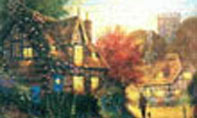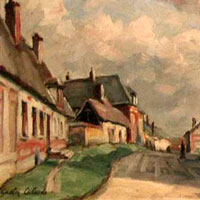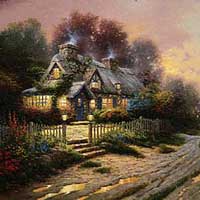- About Us
- Columns
- Letters
- Cartoons
- The Udder Limits
- Archives
- Ezy Reading Archive
- 2024 Cud Archives
- 2023 Cud Archives
- 2022 Cud Archives
- 2021 Cud Archives
- 2020 Cud Archives
- 2015-2019
- 2010-2014
- 2004-2009
 |
Ezy Reading: The Insignificant Edgar Barker |
Nothing seemed particularly extraordinary about Edgar Barker. In fact, to his colleagues, Edgar appeared as ordinary as one could be.
Edgar worked, as he had for the last thirty-three years in the accounts department of the Chesterfield Bank. As a young student he'd shown an aptitude and reliability with numbers, and so, when his headmaster recommended a career as an accountant, Edgar figured it was a fine and respectable vocation by which to earn a living. Though he had never really contemplated what else he might study or become was a mere irrelevance. Decisions had to be made at some point, and this appeared to be the smart and safe one.
 And so, with that, he became an accountant, securing a position initially as a teller in the Chesterfield Bank at twenty-four, and there he still remained at fifty-seven, one of three accountants employed by the small establishment. Though many others had risen beyond Edgar in the bank (the manager himself was younger than Edgar by some ten years) it didn't bother him. There was a security and comfort in the regular routine of his role within the bank, and prospects of management or higher paid positions elsewhere never interested him. He made enough to get by.
And so, with that, he became an accountant, securing a position initially as a teller in the Chesterfield Bank at twenty-four, and there he still remained at fifty-seven, one of three accountants employed by the small establishment. Though many others had risen beyond Edgar in the bank (the manager himself was younger than Edgar by some ten years) it didn't bother him. There was a security and comfort in the regular routine of his role within the bank, and prospects of management or higher paid positions elsewhere never interested him. He made enough to get by.
Edgar was respected in the Chesterfield Bank. Angus Carruthers, the bank's fastidious manager, considered Edgar a reliable and dependable employee. That aside, few of Edgar's co-workers really ever knew him. Edgar didn't ever have a great deal to say, happier each morning to simply retreat into his tiny office and continue his calculations and statistical analysis from the previous day. Even his office provided little evidence of the true nature of the man. It was sparsely decorated save for a photo of his mother and a drab ceramic duck roosting on a bookshelf behind the desk.
Edgar was thus never disliked 'he was harmless and polite enough' but then again, no one had ever become acquainted with him well enough to know to like him. He was but a silent, solitary individual who had floated in and out of the Chesterfield Bank for thirty-three years with few words and an almost 'absent presence'. If anything, Edgar's colleagues might have felt something of a mild pity for him. Never married, living alone in his small cottage on the outskirts of the village, and always wearing the same tired, grey wrinkled hat when spotted about the village on his errands.
 True enough, Edgar lived what might be considered by most a lonely existence. Never, even as a teenager had he enjoyed the affections of a female, but, lost in his studies and by virtue of his shy yet oblivious nature, he may well have never noticed such affections if indeed they were presented and, sadly, once or twice indeed they were. But once again, the lack of companionship never seemed to bother Edgar Barker. Lost in the routine of his daily tasks and preoccupations, he continued on as always. His fixed habits in life, as in work, were comforting, and change was always something he'd rather avoid. A mere hassle to an otherwise contented existence.
True enough, Edgar lived what might be considered by most a lonely existence. Never, even as a teenager had he enjoyed the affections of a female, but, lost in his studies and by virtue of his shy yet oblivious nature, he may well have never noticed such affections if indeed they were presented and, sadly, once or twice indeed they were. But once again, the lack of companionship never seemed to bother Edgar Barker. Lost in the routine of his daily tasks and preoccupations, he continued on as always. His fixed habits in life, as in work, were comforting, and change was always something he'd rather avoid. A mere hassle to an otherwise contented existence.
So on Edgar continued. Every weekday he ate the same breakfast of plum preserve on toast, regardless of the season, whilst at the same time reading the newspaper in exactly the same order; first the weather report, next a brief examination of his stocks, and finally the news of the day. Upon leaving the cottage, old grey hat in hand, Edgar would walk briskly down Larson Lane into Browning Street, without fail he would nod politely through the window to Mrs. Billups the baker, and promptly enter the Chesterfield Bank, with precision timing at eight twenty-seven each and every morning.
Every weekday evening he ate dinner in his armchair seated beside the red brick fireplace his father had built so many years ago. He ate alone, and he ate in silence, however he concluded each dinner with a generous glass of port. And every night he'd find himself asleep around midnight in the armchair before scurrying off to bed half annoyed with himself lest he not wake up rested the following morning' but not before laying out the next day's work-clothes from his cupboard.
Edgar's one extravagance came on the last Sunday of every month. The day before he always bought a goose at the morning markets from Dan Dyer, the Scottish butcher with giant arms that looked like the outstretched branches of a tall oak tree. Edgar considered him more than a little intimidating to say the least, despite his jovial nature. Regardless, once he had returned from church Sunday morning, Edgar set about cleaning, stuffing and roasting the bird until three in the afternoon, when the alluring aromas emerged to taunt all that passed by his cottage. Until he was thirty-eight, Edgar feasted upon roast goose one Sunday in every month with his mother, but, even after her passing, he resolved that since he enjoyed the meal so much (and, of course, the routine of it all) he would continue with his tradition.
 This was, then, all that appeared to be of Edgar Barker. Quiet, introverted, and leading a simple but honest life. Alone, perhaps lonely, and a man that may have made a young lady happy had he ever summoned the courage to explore such a possibility so many years before. Reliable and regimented, devout, but really the sort of individual that might well simply drift in and out of life without ever having been particularly noticed at all. Certainly Edgar had not led a wicked or wayward life, but it was a life which some could have considered from afar as somewhat unfulfilled; unlikely to leave a mark.
This was, then, all that appeared to be of Edgar Barker. Quiet, introverted, and leading a simple but honest life. Alone, perhaps lonely, and a man that may have made a young lady happy had he ever summoned the courage to explore such a possibility so many years before. Reliable and regimented, devout, but really the sort of individual that might well simply drift in and out of life without ever having been particularly noticed at all. Certainly Edgar had not led a wicked or wayward life, but it was a life which some could have considered from afar as somewhat unfulfilled; unlikely to leave a mark.
But as easily as these assumptions might have been made, as easily as Edgar's life might be considered rather misspent, even insignificant, such assumptions would always overlook one important element of Edgar's character. He was completely content. And, though Edgar was not a particularly ambitious or adventurous man, rather someone who was happy to keep his concerns and activities basic and free from complication, his was a true contentedness born from another of his routines. It was a routine unknown to all but to himself.
For each evening, as Edgar Barker's dinner cooked away on his ancient iron stove he took a seat at his desk and opened the top drawer. Reaching in, as he did each and every day, he removed a large leather bound book and placed it on the desk. Hundreds of pages overflowed from the tome, and along the spine of the book were countless pinholes where binders had been removed and added over the years to make way for more sheets of paper. Indeed, as Edgar would flick through the book, the earlier, dog'eared and yellowing pages gradually made way for fresher, whiter sheets. Taking in a deep breath the musty paper and fading ink gave evidence to the years gone by since his first words were written down.
 And upon every space available on a sheet of paper were those words. Thousands and thousands of words dating well back to his youth. Words shaped to form sonnets, odes, and epic poems. Rhyming and free verse, couplets and quatrains, even elegies and limericks. All were contained within. It was his most favourite routine. Grasping the pen in hand, Edgar would close his eyes for but a brief moment, picture his designation, and then fall upon the paper with such an excited energy that he would scarcely remember it was time to eat once an hour or more had passed.
And upon every space available on a sheet of paper were those words. Thousands and thousands of words dating well back to his youth. Words shaped to form sonnets, odes, and epic poems. Rhyming and free verse, couplets and quatrains, even elegies and limericks. All were contained within. It was his most favourite routine. Grasping the pen in hand, Edgar would close his eyes for but a brief moment, picture his designation, and then fall upon the paper with such an excited energy that he would scarcely remember it was time to eat once an hour or more had passed.
One evening he might be ponderous:
If every falling star in a night of thousands
Could truly grant us our every wish
Would our first wishes fall for the ones we loved?
Perchance for the ones we ne'er nor shall ever know?
Or would we ignore the certainties of each and every evening sky and let our hearts fall upon doubt
And, lest they be the last for all eternity, seize the first and next hundred wishes as our very own?
The next night lost in dark thoughts:
Fading midwinter light meets shifting strands of deathly hues
And the last cries of the day melt into a blurring vision
Gloom gently descends in a sad dance of the dusk
Shadows lengthen and I fear the rain might fall again
While on another evening contemplations of love would preoccupy him:
Might I drink of sweet embrace,
Feast of song from thine own good heart
Taste the joys of perfect grace
And shed the grief of time apart
 It was these words, then, this creative 'routine' which kept Edgar Barker so truly at ease. A bland, solitary existence was quite satisfactory amid the great loves, dramatic tales and inspiring journeys he concocted each and every night. Edgar was familiar with exotic lands far afield as well as those in the realms of fantasy. He knew of love and of loss. And he knew of the heights of the human condition, of absolute freedom of spirit, for he saw it playing out within his mind's eye each and every night before committing these inspirations to paper.
It was these words, then, this creative 'routine' which kept Edgar Barker so truly at ease. A bland, solitary existence was quite satisfactory amid the great loves, dramatic tales and inspiring journeys he concocted each and every night. Edgar was familiar with exotic lands far afield as well as those in the realms of fantasy. He knew of love and of loss. And he knew of the heights of the human condition, of absolute freedom of spirit, for he saw it playing out within his mind's eye each and every night before committing these inspirations to paper.
Dining alone and in silence as he always did, who could have known Edgar was not a sad, solitary, and misspent individual? Who knew the joyful secrets of his character that lay in leather bound book? Edgar's outward silence masked the gratification and pure well being drawn from great battles and myths of old, to magnificent beauty in nature. From the cruel chills of a deep winter, to the triumphs of love over tragedy. No, pity would honour others more fittingly. It was these tales, these heights of emotion that captivated Edgar Barker. As he sat in silence in the armchair by the fire, his heart was content, and inspired thoughts accompanied him well into the late hours of another still village night.
